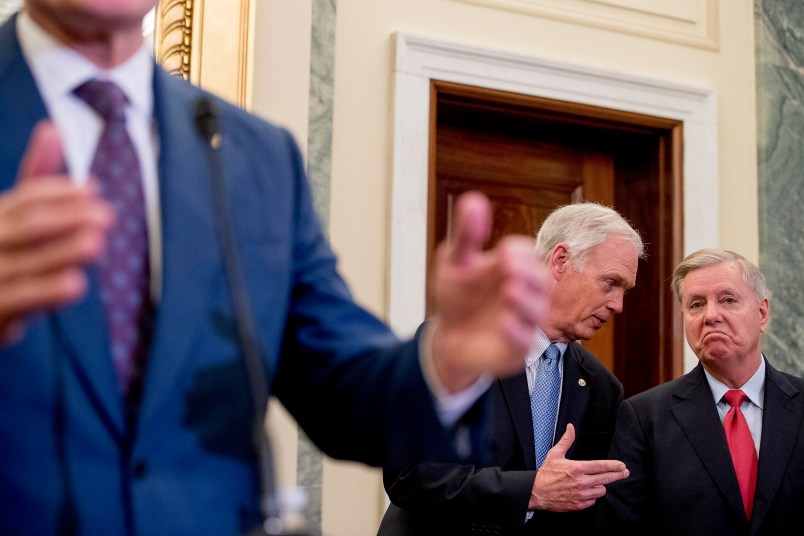Cameron Joseph contributed reporting.
The Senate has less than two weeks, and just a handful of working days, to repeal Obamacare and block-grant Medicaid with a mere 50 votes.
“This vehicle that we’re using turns into a pumpkin on September 30th if we don’t get something else done,” Sen. Mike Rounds (R-SD) warned Tuesday.
With the clock ticking, Senate Republicans have thrown together a crude imitation of regular order in an attempt to quickly check all the necessary boxes and win over their colleagues who are sticklers for process. Next week, they plan to plow through a single hearing, receive an incomplete analysis from the Congressional Budget Office, and if they shore up the votes, take it to the Senate floor for a whopping 90 seconds of debate before launching into a vote-a-rama.
Some Republican lawmakers are less than pleased.
“That’s problematic because that is part of the problem of short-circuiting the process,” Sen. Susan Collins (R-ME) complained, lamenting that the last-minute repeal effort is having the side effect of killing the bipartisan health care stabilization bill she and others have spent months negotiating.
Despite their paeans about respecting “regular order,” and barring any surprise defections or changes, this is the process the GOP will use over the next week to take one last run at repealing the Affordable Care Act.
Partial CBO report
Early next week, the Congressional Budget Office will release a “preliminary assessment” of the Graham-Cassidy-Heller-Johnson bill that won’t include information about what would happen to insurance premiums or how many people could lose their health insurance if the plan became law.
“The CBO scoring is just a detail,” bill co-sponsor Sen. Ron Johnson (R-WI) argued Tuesday, reviving the popular but inaccurate Republican talking point that the agency’s data cannot be trusted. “We’ve been highly disappointed in how CBO has conducted itself throughout this health care process. I have some real questions about CBO.”
Sen. John Thune (R-SD), a member of the GOP leadership team, also characterized the CBO score not as necessary information but rather a hoop Republicans must jump through in order to use the 50-vote reconciliation threshold.
“The requirement is that we have a CBO score, so we have to have some information in order to vote,” he said. “I think that most of our members have already been attacked over and over again on previous CBO scores for not having enough people covered back home. So I think for most of our people, at this point, their skin is pretty thick when it comes to the CBO.”
But several Republicans including, Collins, Lisa Murkowski (R-AK) and Shelley Moore Capito (R-WV) are not waving away the lack of a complete CBO assessment.
Collins called the omission “pretty major.” Capito told TPM on Tuesday: “There is still more information I need” to make a decision.
A single hearing
Early on Monday evening, Senate Finance Committee Chair Orrin Hatch (R-UT) argued to TPM that no hearing on the repeal bill was necessary because “people are pretty familiar with Graham-Cassidy already.” Later that evening, he announced a hearing, which will take place next Monday. It will not include a markup in which lawmakers could offer changes to the bill.
Hatch told reporters Tuesday that because so many people were “complaining” about the lack of a hearing, “I decided to just hold a hearing and that would solve a lot of the problems.”
Sen. Ron Wyden (D-OR), the top Democrat on that committee, said he wasn’t consulted or included at all in the decision, a breach of Senate norms.
“This is a sham process that makes a mockery of regular order,” he said in a fiery statement. “Even setting aside the disastrous consequences the Cassidy-Graham-Heller bill would have for Americans across the country, the Finance Committee cannot adequately examine a proposal this massive in a single hearing.”
The committee’s move is largely seen as a offering to Sen. John McCain (R-AZ), who has not yet pledged to vote for the bill and who has repeatedly insisted on following “regular order.” But McCain signaled Tuesday that he may not be mollified by a single hearing with no bipartisan collaboration mere days before the vote.
“You think that that’s regular order?” he asked IJR. “I always thought regular order was hearings and debates and amendments and then to the floor with debates, discussion, and amendments. That’s what I thought regular order was.”
Take it or leave it
When Republicans were marshaling the votes for repealing Obamacare in July, they repeatedly assured lawmakers and the public that voting for the bill was merely a vote to advance the process, and that any problems in the legislation could be fixed in conference with the House.
They are not making that argument this time around.
Instead Republicans are touting the fact that the bill that was only unveiled last week could come straight to the Senate floor, and if passed, would pass in the House and go straight to the president’s desk. Under the rules of reconciliation, there is no time for a conference between the House and Senate to iron out policy differences.
And because the bill is structured as an amendment to the underlying health care bill that got a cloture vote in May, it would only get 90 seconds of debate time in the Senate. Lawmakers could offer amendments, but the process would terminate in an up-or-down simple majority vote.
To create an additional sense of urgency, Sen. Lindsey Graham (R-SC) warned Tuesday that neither the White House nor the GOP House were prepared to support bipartisan efforts to stabilize or, in his words, “prop up” Obamacare. The message to wavering senators was that Obamacare will collapse anyway, so get on board with repeal.
“We are ready as soon as there are 50 votes for it,” Senate Whip John Cornyn (R-TX) enthused Tuesday.










